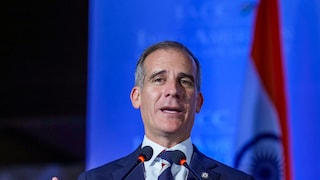Curated By: Shankhyaneel Sarkar
News18.com
Last Updated: April 01, 2024, 08:35 IST
New Delhi, India
US Ambassador to India Eric Garcetti defended his stance on the CAA during a discussion with news agency ANI. (Image: PTI)
US envoy to India Eric Garcetti defended his comments on the Citizenship Amendment Act, 2019 (CAA) saying it is the job of the envoy to monitor and report and said that religious freedom is an integral part of democracies.
“I said in broad strokes that religious freedom is an important part of any democracy. Protecting minorities is very important. That doesn’t have to be read negatively,” Garcetti told news agency ANI.
“I think it’s the job of monitoring what happens. That’s the job of an ambassador. That’s the job of a state department. The Ministry of External Affairs’ job and the Indian ambassador’s job is to monitor and to report. And we simply said that,” he further added.
He also said that the US too has a “ton of flaws” and remains open to criticism. He, however, pointed out that there is a need to find a common international law while respecting every country’s specific history.
“We have a deep friendship. It’s very respectful. Sometimes we can agree to disagree on things and continue with our business, and we shouldn’t take it with thin skin. We shouldn’t take it personally,” the US envoy said.
The US stance on the CAA has led to the Indian external affairs ministry to say that those who have a limited understanding of India’s pluralistic traditions and the region’s post partition history should not attempt to comment on it.
“The Citizenship Amendment Act, 2019 (CAA) is an internal matter of India and is in keeping with India’s inclusive traditions and our long-standing commitment to human rights. As regards the US State Department’s statement on the implementation of CAA, we are of the view that it is misplaced, misinformed, and unwarranted,” the external affairs ministry (EAM) said after the US raised concerns regarding the CAA.
“We are concerned about the notification of the Citizenship (Amendment) Act on March 11,” said State Department Spokesperson Matthew Miller at a press briefing in Washington DC on March 14.
“Lectures by those who have a limited understanding of India’s pluralistic traditions and the region’s post partition history are best not attempted. Partners and well-wishers of India should welcome the intent with which this step has been taken,” MEA spokesperson Randhir Jaiswal said in response to the US criticism.
Garcetti told the news agency that the US remains open to criticism. “Certainly, I open up the United States, I say all the time, from a place of humility. We have a ton of flaws. We’re open to criticism. We want to listen,” Garcetti said.
He also called for a common international law. “The most important thing for all of us is to find common international law that we can all be a part of, try to implement equally, and respect the specific histories that every country has,” he further added.
